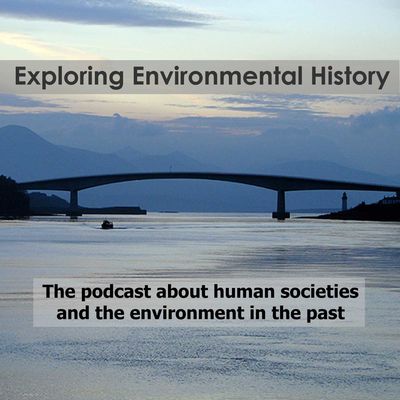Exploring Environmental History is the podcast about human societies and the environment in the past.
http://www.eh-resources.org/podcast/podcast.html
Gesamtlänge aller Episoden: 1 day 10 hours 24 minutes
recommended podcasts
Scientific and environmental diplomacy and the Antarctic
Antarctica is a unique continent because is mostly covered in ice and, importantly, it is the only continent that has never been settled by humans until scientific bases were established in the 20th C. This makes it an international space which has...
The Scottish forestry experience and the development of forestry in India
Since at least the 18th century Scotland has been the centre of forestry knowledge in Britain. Many foresters and botanists trained on Scottish estates went into the colonial service in during the 19th century and what they brought with them was a...
Conquering the Highlands. History of the afforestation of the Scottish uplands
By the end of the nineteenth century, Scotland's woodlands were reduced to about six per cent of land cover. Over the course of the twentieth century, foresters worked to establish timber reserves in the Scottish Highlands, creating forests on...
Kielder: the story of a man-made landscape
Around the world, rural landscapes have been transformed by human activity as never before. In England, one of the most striking locations of such anthropogenic changes is Kielder Forest and Water in Northumberland. Since the 1920s, this site has seen...
Remaking wetlands: a tale of rice, ducks and floods in the Murrumbidgee River region
Before the arrival of Europeans and their agriculture, Australian ducks only had to compete with other native birds and animals, as well as Aboriginal hunters. However, the introduction of water intensive agricultural activity by Europeans changed all...
Canine City: Dogs and Humans in Urban History
In the modern urbanized world it is often forgotten that throughout history humans have been very dependent on animals for their survival and livelihoods. Until recently most humans in the developed world share their cities with animals, in particular...
Explorations in historical climatology
For many historical climatologists cold, wet and stormy weather worsened life for most European people and harmed the economy during the early modern period. Warmth on the other hand is generally regarded as a beneficial thing but too much of it is...
Medicinal plants in New Zealand: bridging the gap between medical and environmental history
Medical historians often presume that 19th century European settlers of New Zealand and other parts of the world relied on the emerging inorganic medicines and colonial doctors to maintain their health. However, there is also another story that seems...
Silent Spring at 50: a comparison perspective
2012 marks the 50th anniversary of the publication of Rachel Carson’s book “Silent Spring”. This publication is often regarded as the beginning of the modern environmental movement, in particular in the US. Silent Spring documents...
A transformed landscape: the steppes of Ukraine and Russia
The steppes of Ukraine and Russia were once a sea of grass on rolling plains on which pastoral nomadic peoples grazed their herds of livestock. From the eighteenth century, the steppes have been transformed into a major agricultural region. This...








